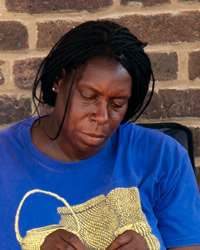Black Creole, Gullah in United States

Photo Source:
Mattstone911 - Wikimedia
Creative Commons
|
Send Joshua Project a map of this people group.
|
| People Name: | Black Creole, Gullah |
| Country: | United States |
| 10/40 Window: | No |
| Population: | 305,000 |
| World Population: | 305,000 |
| Primary Language: | Sea Island English Creole |
| Primary Religion: | Christianity |
| Christian Adherents: | 95.00 % |
| Evangelicals: | 12.00 % |
| Scripture: | New Testament |
| Ministry Resources: | Yes |
| Jesus Film: | No |
| Audio Recordings: | Yes |
| People Cluster: | Afro-American, Northern |
| Affinity Bloc: | North American Peoples |
| Progress Level: |
|
Introduction / History
The Gullah people, also known as Geechee, are descendants of enslaved Africans who were brought to the southeastern coast of the United States—particularly the Sea Islands and coastal plains of South Carolina, Georgia, North Carolina, and Florida—to work on rice, indigo, and cotton plantations. Due to geographic isolation and plantation conditions, they developed a unique creole culture that preserved many West and Central African traditions, including language, spirituality, and customs.
Their language, Sea Island English Creole (commonly called Gullah), is an English-based creole infused with African vocabulary and grammatical structures. It served as a common tongue among enslaved Africans from diverse ethnic backgrounds and remains a vital symbol of identity today.
What Are Their Lives Like?
Gullah communities have historically lived in rural, coastal areas, maintaining traditions in farming, fishing, basket weaving, quilting, storytelling, and cuisine. Their lifestyle reflects a strong sense of community, kinship, and cultural continuity, rooted in African heritage.
What Are Their Beliefs?
The Gullah are predominantly Christian, with a spiritual tradition that blends African religious customs with Christian practices. Their worship includes ring shouts, call-and-response singing, testimonies, and praise houses, reflecting African communal spirituality. They also retain elements of ancestor veneration, spiritual healing (root work), and belief in spirits, which are rooted in West African traditions. These beliefs coexist with Christian theology, creating a syncretic spiritual system that is deeply embedded in Gullah identity.
What Are Their Needs?
However, modern challenges threaten their way of life. Land loss due to rising property taxes, coastal development, and climate change have endangered Gullah communities, especially on islands like Sapelo and Hilton Head. Many Gullah families face economic fragility, limited infrastructure, and displacement due to tourism and gentrification.
Gullahs need spiritual renewal in areas where Christianity is mixed with folk beliefs and lacks biblical grounding.
Prayer Points
Pray for spiritual revival among Gullah churches and communities, that faith in Christ would flourish and deepen.
Pray for wise and courageous leaders to rise up within Gullah communities to protect land, culture, and spiritual heritage.
Pray for healing and restoration for families affected by displacement, poverty, and cultural erosion.
Pray for discipleship movements that equip Gullah believers to share the gospel and mentor others in biblical truth.
Pray for unity among Gullah Christians, and for their churches to become sending forces for missions and cultural renewal.